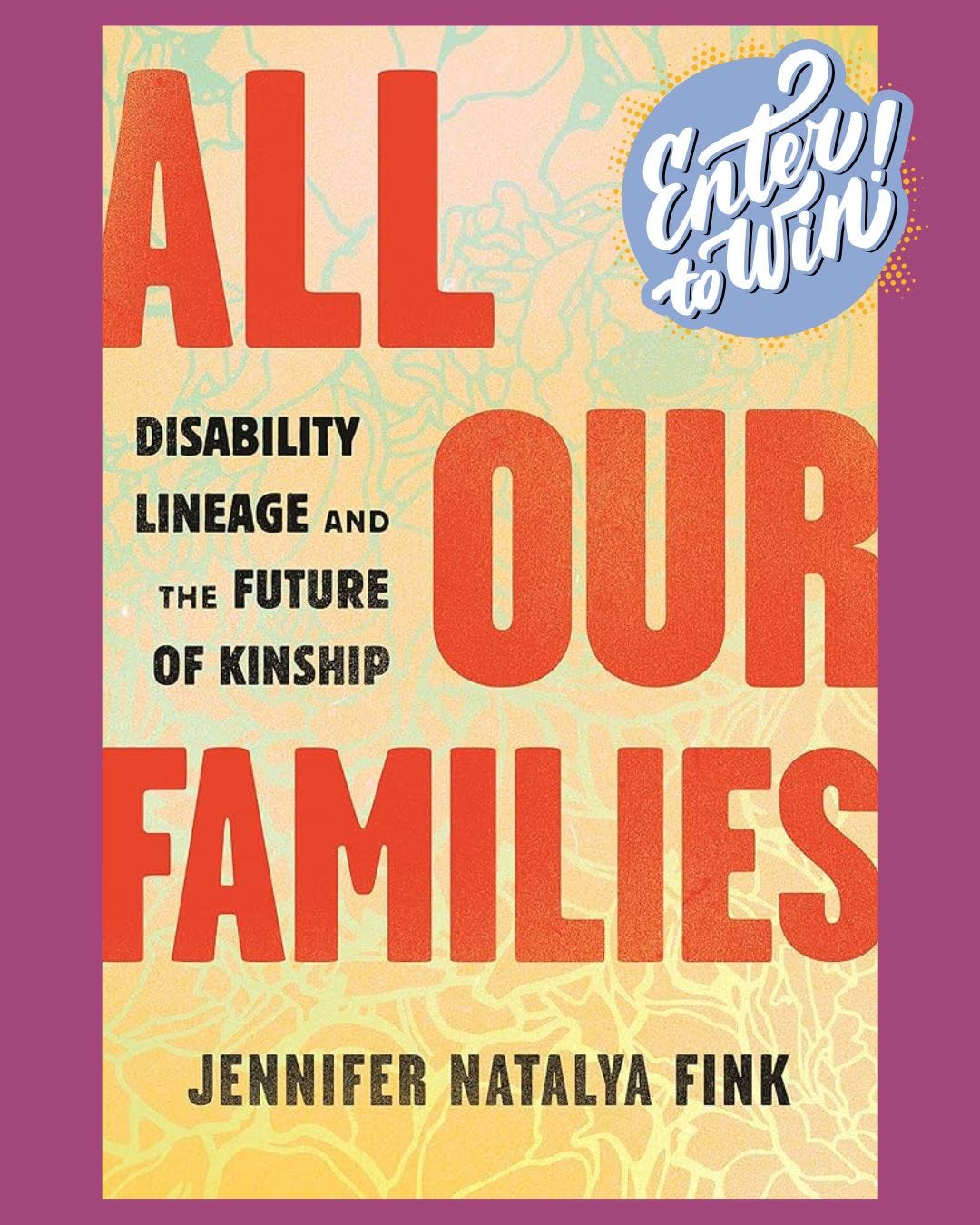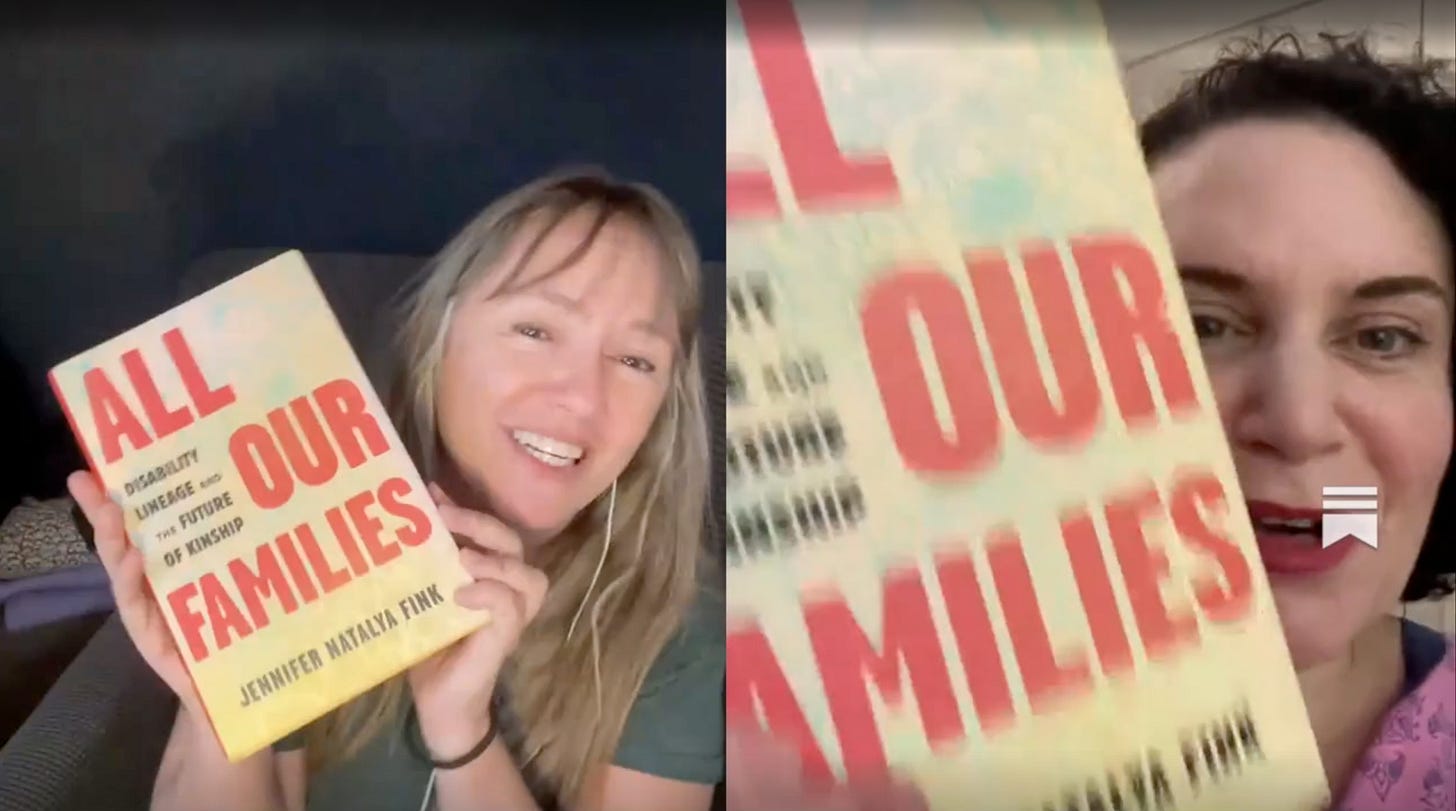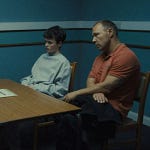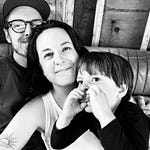Jennifer Natalya Fink joined me live to discuss how even introverted parents can create vibrant communities for their neurodivergent children, and for themselves.
Even Introverted Parents Need Community With Jennifer Natalya Fink
How giving kids a space to be themselves & enjoy friendships without pressure to conform can transform their lives - and yours!
Kate: So Jennifer and I had this amazing conversation. Listen to the podcast or watch it on YouTube.
If you're raising a neurodivergent kid, any kind of isolation or confusion that you have. I think it could really be a great strategy to start to build or find community.
And Jennifer really lays out how.
Feel free to pop in. We're just casual here.
JNF: Yeah. I try to be really concrete in my book, ‘All Our Families’.
Kate: I've got a copy of it too.
JNF: Our books can clink.
Kate: You can win it. It's really easy!
JNF: I try to get really concrete and practical 'cause I know that was something, even the first couple years after a diagnosis, I just felt very flooded with information and different ideas and different theories and, you know, not that much that was very concrete besides, put your kid in a thousand hours of ABA, which like, we didn't do 'cause it was so terrible. Yeah. Your life's gonna suck. there's medical advice and educational advice that's evidence-based. It's useful.
But what nobody said was, you need to find your people. You need to find your tribe, you need to find community, and you need to help build that if that's not there for you.
it can be specific to your child's disability or diagnosis, but it can also just be larger disability community. I think for a lot of parents, what keeps them from doing that, first of all, our society treats disability or neurodivergence as an individual problem to be solved, as opposed to, a normal way of being in the world.
There have always been people like this, you know? That's what my whole book's about. but they really don't emphasize community and the need for that and how.
Kate: When you started to prioritize community, what did you see, in yourself and in your daughter?
JNF: Well, I felt like, my daughter really wanted friends who were similar to her in this way. There's so much emphasis on mainstreaming and integration. That kind of wasn't what she wanted.
And she also, specifically, she's like a more gendered person than I'm in lot ways. She wanted girls. She wanted to know some autistic girls. So we sort of made that happen. We made a girls group, we also did mixed gender stuff and no gender.
She was really hungry for that. And then I felt less isolated and these community events also weren't so pathologizing. They weren't about like, what's wrong with your kid, or this deficit model.
Sure we should all be growing and changing. It's just, that's not community building. That's not joyful. That's not celebrating and building relationships, you know?
Our kids sometimes need some supports doing that, but also might just be relating in a different way. We can create a community where there's room for that between kids.
And now, these kids in our community have kind of grown up together. My daughter just turned 18 and she's gonna have her birthday with another girl who has a similar diagnosis who, we've been doing this for almost 10 years with.
Kate: I just wanna say happy birthday to you.
JNF: Thank you.
Kate: It's the parents who have been there from the beginning and have done so much.
JNF: I didn't realize how isolated I was, you know?
Most of my close friends were single queer people who had zero interest in children. I didn't have a lot of friends, honestly, who had kids, and I was older than a lot of the parents. Mm-hmm. And then we had this diagnosis, which was very isolating. I'm sort of a little bit of an idiosyncratic kind of loner person.
Kate: I think in this community there are a lot of us.
JNF: There are a lot of us. You and I have talked about that.
I didn't really notice, because I'm never a big joiner or a group person, that I was really isolated in what was going on.
And my partner and I were in this isolation together.
So I think when we started finding community, and building it when it wasn't there to just do fun stuff.
It can be really simple. Like we take a walk once a month at a local park, doesn't cost anything.
You show up or you don't. You come later, you can catch up. Your kids have your meltdown, you can go home. Like no big deal. But community doesn't have to mean a nonprofit.
Like once a month you're gonna take a walk with other parents and kids who have sort of similar profiles. I think that can be really profound. And if you do that over 10 years, you have a community. If you do it once, big deal.
There were families much more isolated than us.
New immigrants whose kids had this diagnosis, who had language challenges, who were already isolated, for example. People who were much less resourced than we are. We saw there were families where the kids were really not leaving the house much except for school. Or even being homeschooled and really not leaving the house 'cause behaviors were challenging or whatever. Right.
So we always make it super accessible 'cause there are some people in our community whose kids do better using wheelchairs. And we encourage that. Like, okay, so your kid, for whatever reason, just anxiety, is it hard for them to walk, try a wheelchair.
I think the big obstacle is, you have to become comfortable with the idea of difference and disability.
As long as you're in denial and you're like, I'm gonna beat this thing, you can't really do this. That's what I realized.
Even the most basic community building that's so enriching for your family and yourself and your kid, you can't really do when you're in denial.
Kate: Yeah.
You had one experience where you attended a group and you really didn't feel like you fit in. I remember you saying there was a lot of venting. Is that right? And then, you created something different.
JNF: My kid was going to preschool. I think the problem was that it was all venting and no community building.
A lot of the parents were really in a lot of denial, expressing a lot of anger and frustration, either at the system or their own children.
What I think was not great was that nobody said, gee, you guys all have this hour free, on Tuesdays at 11.
On the days we don't meet, why don't you guys take a walk or get a Starbucks, and consider, maybe doing something with your families. I think that community building piece wasn't there and some of the parents really didn't even wanna be in the room because it meant their kid was one of the weirdos.
Because I'm queer, because I'm a weirdo, like that stigma just doesn't work on me. I don't wanna be a normie. it's not gonna happen. I felt like it was a little easier for me.
I think that was part of it, that when we did go to these groups, it was such a bummer fest. Just all this complaining and blaming the kids, and I think that the facilitators tried to balance that and the idea of processing things, but some of it seemed really recursive. And part of it was they weren't building community and they felt so isolated. I think that was something I was thinking about in my book. For me the challenge wasn't so much denial. There was some, but I got over that part pretty fast.
It's more just that I'm so introverted that it doesn't occur to me.
I first was doing it for my daughter, all this community stuff. And then I realized, no, this benefits you, Jennifer. You're not gonna love everybody who shows up and this might be the only thing you have in common with them, but it's actually a lot.
And for kids to have spaces where they can be around other kids similar to them, that is not a therapeutic situation. That is not an assimilate to the norm situation. I think that's very meaningful to them. To see themselves mirrored in a positive way and for everything to not be therapy.
Kate: And sometimes they have similar interests and can bond over those similar interests. My son did a lot of parallel play when he was younger and people would be like, oh, but that's just parallel play. I am like, they are sitting back to back doing their own things, but every once in a while I can tell they're checking in with each other.
And like my son never, when he was little, like would ask for play dates or anything like that, but. we lucked into a built-in community. I told you the story on the podcast.
I'll leave that for people to actually listen to the podcast.
We really fell into this little group and, he never asked for play dates, but I saw how overjoyed he was when he saw his friends.
JNF: Yeah. And I think this speaks to this stereotype that's really wrong. Neurodiverse people sometimes socialize differently, but I feel like my daughter's actually a lot more social than I am. She really likes to socialize in her own ways. But you know, she's very interested in people. I think this devaluing of the way our kids do play or connect, saying you have to connect in this one way. And a lot of the therapeutic interventions kind of model that. I think it's really problematic!
Kate: Let's just let our kids be kids.
JNF: Let them play the way they wanna play.
Kate: Let them get to know other kids where they, like you said, can see themselves mirrored and don't feel like the odd one out.
I love being in communities where I don't feel like the odd one out.
JNF: That just made so much sense to me. And that isn't to say that, we don't push or challenge her or we don't do integrated things. But one doesn't preclude the other.
Kate: I think the people in Atypical Kids, Mindful Parents, who are subscribers here, I think they really get that. And I think they're seeking their deeper level of community. And, you know, that's why they're here.
I know they're gonna love your book. I am really excited that somebody is gonna get a free copy from you, a giveaway. Yeah, a signed copy specifically for you. Please go and enter.
The episode is about positive disability identity.
Go enter to win. You have great chances!
JNF: I always love hearing from readers. I visit schools. I do all kinds of outreach around these issues and it's important we fight for our kids and for our rights at this time.
I really appreciate the work that Kate's doing to develop community for atypical kids and their parents. It's really important, Kate.
Kate: Thank you so much for being with me.
JNF: Thank you so much, Kate.
Kate: Thank you Jennifer. Listen or watch the episode. Thank you for being here, parents!
















Share this post